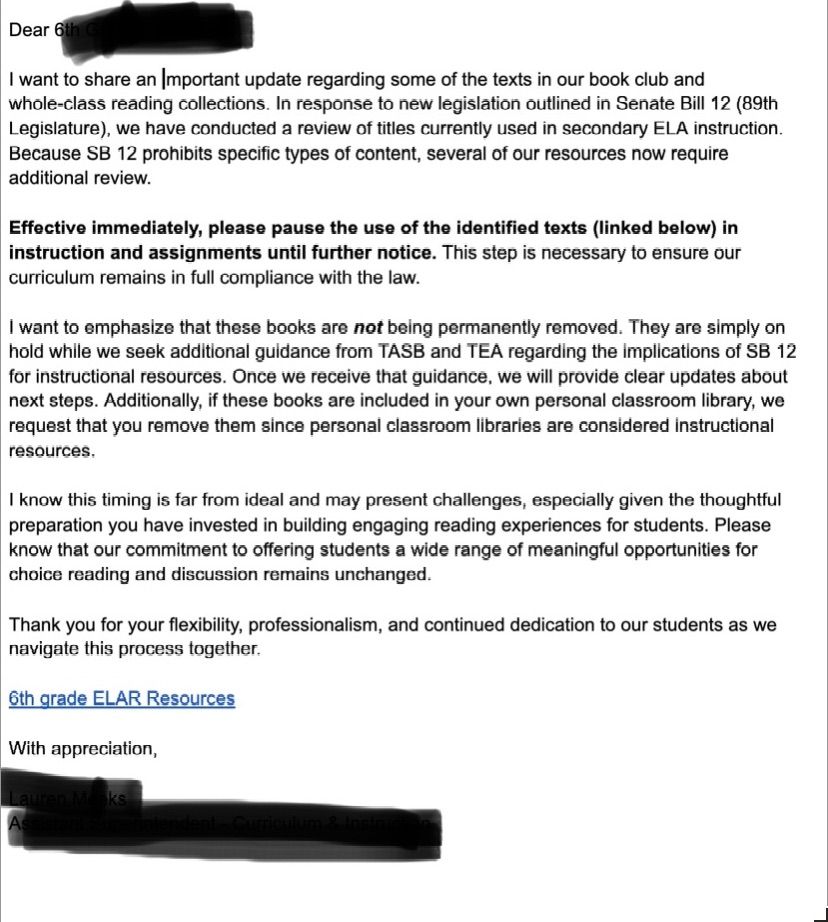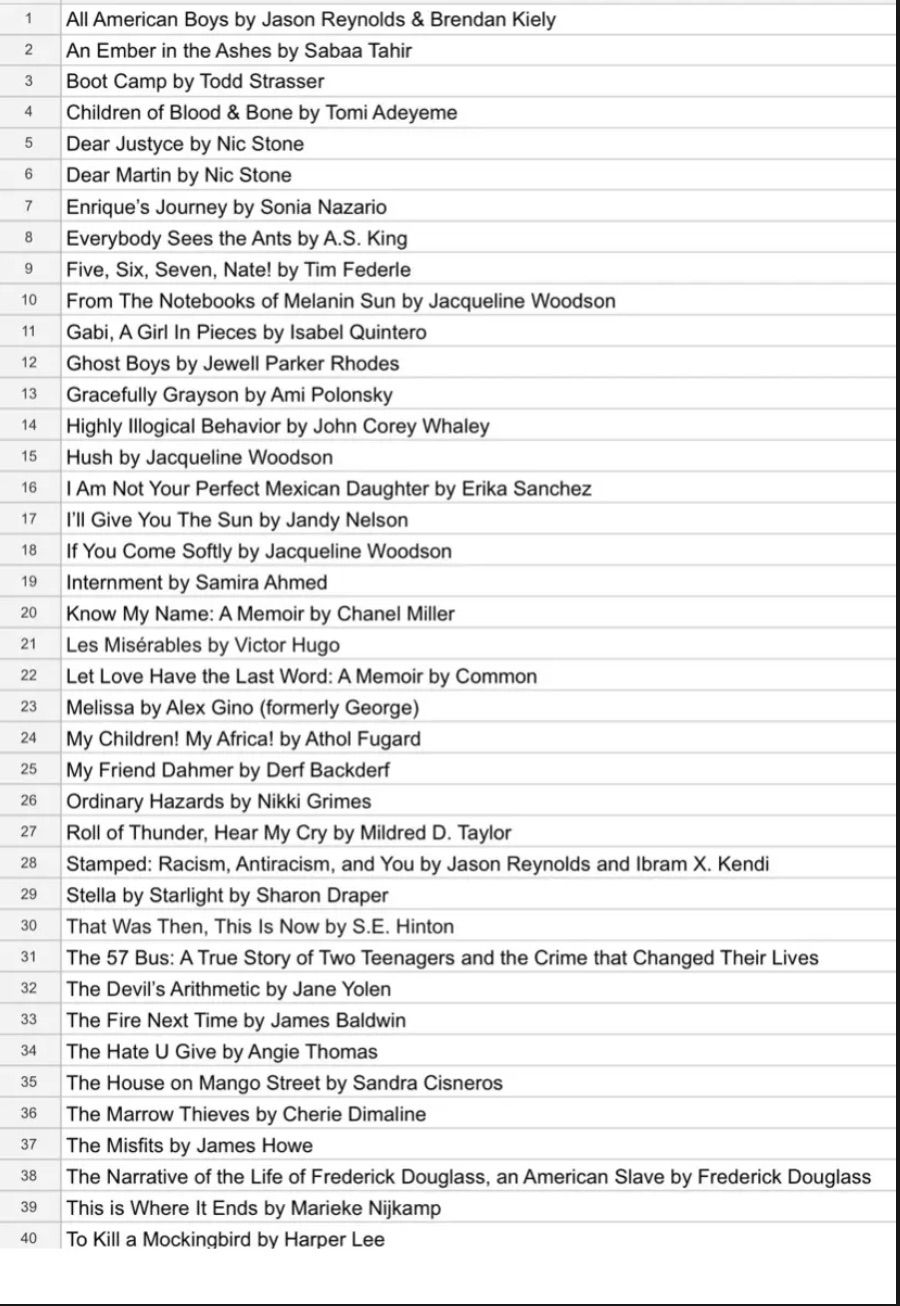Texas School Administrators Use A.I. To Ban Books Like TO KILL A MOCKINGBIRD
⚓ Books 📅 2025-09-30 👤 surdeus 👁️ 13Leander Independent School District (LISD), located half an hour northwest of Austin, Texas, has been one of the canaries in the coal mine of book censorship. In February 2021, parents began to complain about the inappropriate content in books that were included on a list for a student book club. One parent used this meeting to gain her 15 minutes of virality by brandishing a pink sex toy when speaking about the content in Carmen Maria Machado’s In The Dream House, a memoir about queer domestic violence.
The district continued to remove books throughout the year, including The Lottery by Miles Hyman (the graphic novel adaptation of The Lottery by Shirley Jackson), Kiss Number 8 by Colleen AF Venable and illustrated by Ellen T. Crenshaw, The Handmaid’s Tale: The Graphic Novel by Margaret Atwood, and several others. Just a few months after the removal of those books, a parent reported the contents of a book available in some of the 11th and 12th grade classrooms for free reading–not assigned reading–to local police.
In the years since, the school board at Leander has seen new leadership, with more commitment to keeping materials available and accessible to students in the district. That swing isn’t a surprise, given that we’ve seen districts where book banning has run rampant appoint or elect new board members whose time is spent on meeting the needs of students, rather than the agendas of a few loud, performative parents.
This is all context for the latest book banning in LISD: removing literary classics, as well as popular targets of book bans, from school shelves in response to Texas’s Senate Bill 12 (SB 12).
Much of the focus of Texas’s slate of new pro-book ban legislation passed this year has been on Senate Bill 13 (SB 13). SB 13 outlines the materials deemed “inappropriate” in public and public charter school libraries, and it provides for parents to be involved in the book review process. SB 13 is ultimately about giving the state power to dictate books allowed in its school libraries by removing local control.
But SB 12 is as dangerous to student access to books as SB 13. SB 12 is a sprawling “parental rights” bill that bans schools from diversity, equity, and inclusion (“DEI”); bans schools from anything related to LGBTQ+ topics, including Gender and Sexuality clubs (something legally required via the Equal Access Act of 1989, Section 20, were we under a functioning Department of Education enforcing such Acts); and more.
In Leander, this has translated to the district’s administration emailing teachers and advising them to “pause” using 40 books which contain topics related to “DEI.”
 |
The list of 40 books to be put on “pause” include numerous regular targets of book bans across the state and nation since 2021. But it also includes several titles that are classic classroom reads, including Harper Lee’s To Kill a Mockingbird–a title that book banners frequently point to as a title they would never ban.
Whatever the timeframe of this “pause” may be, the books being made unavailable to students in the district means those books are banned. Students cannot access them, and per the district, there’s no timeframe for when or if those titles will return.
“Pause” is the same language the district used in banning books previously.
At least 26 of the authors of the 40 books are BIPOC and/or Latine. In other words, more than half of the list specifically targets marginalized writers. Numerous LGBTQ+ authors are also included.
 |
As reported by Frank Strong, what makes this case even more infuriating is that district officials used Artificial Intelligence to create their list, allowing them to abdicate responsibility for the decision to an even further degree. First, they can blame state legislation for the removal of books, then they can blame A.I. for identifying these specific titles.
Strong, one of the founders of the Texas Freedom to Read Project, was first the sound the alarm about the removal of these books. He writes:
According to two district sources, AI was used to measure instructional texts against a rubric that took into account “DEI content.” The books must be removed from all classrooms, and cannot be used as instructional resources—either as texts read in class or as choice books in classroom libraries. Though the books have received no formal challenge, they are currently awaiting further review.
One district teacher told me that their principal suggested they “remove any other books that may related to the same themes/ideas/topics as the ones currently being removed.”
Per Fox 7, administrators at LISD used A.I. to begin their initial title culling from a larger list. They then did a “manual review” for the list of 40 books.
This wouldn’t be the first district to turn to A.I. to handle potential repercussions related to state laws around concepts banned in public schools. We saw this in Mason City, Iowa, where district officials used A.I. to identify books with “sex acts” under that state’s “Don’t Say Gay” bill. It’s beginning to take shape in Utah, too. A.I. has also the selling point of OnShelf by Bookmarked, a software being sold to Texas school districts as a “solution” to navigating book bans. That software was created by an individual who testified in favor of SB 13 when it was before Texas legislators in 2023.
A source familiar with LISD noted that school board members were not made aware of the administration’s plans to “pause” book use prior to the email educators received. Given the power that the state has passed on to school boards in Texas, this story raises even more questions about where and why administrators would bypass their own boards in demanding compliance in advance.
There is always an opportunity to push back, and given that administrators in LISD noted the removal of these books is a “pause,” it is especially crucial to speak up and out and get those titles back on shelves.
Strong highlights three crucial steps to take right now:
- The next LISD board is meeting on October 9th. “Before and on that day, they need to hear from district residents and parents. If you’re not in Leander ISD, you can share this news with people who are in the district—try to get as much attention as possible directed towards this issue. These decisions happened below the board level, and I’m confident that when the board gets involved, they will work to rectify this mistake. Banning books that deal with race or racism is blatantly unconstitutional—the ACLU is already suing to stop SB12, and there is no reason for Leander ISD to violate its students rights.”
- Hold the elected officials who passed SB 12 accountable for their actions. “The bill was written by Brandon Creighton, and Jeff Leach was its House sponsor. It had unanimous support from Republicans in both chambers. Write your representative and senator and let them know how the law is being used.”
- Inform lawmakers that they’re being watched, their words are being heard, and their decisions are being used in ways that they claim they’re not in favor of. “SB12 is far from the only book-banning bill that was passed last session. Many of the lawmakers who voted for Senate Bill 13 justified their votes by saying they weren’t voting to remove books for the ideas they contain. But then virtually all of them voted for Senate Bill 12, too. We need to let lawmakers know we see how these laws work together, that we’re not stupid, and that we’re not going to stand for them dismantling our Constitution bit by bit.”
LISD is also holding a special board meeting tonight, September 30. As of now, there is no mention of SB 12 on the agenda.
This is a developing story, but as Leander has become a familiar name to those who’ve been engaged with the topic of book banning since its astronomical rise in 2021, this is no doubt but the first of many stories we’ll hear of districts throughout Texas choosing to “pause” or all together get rid of books in advance of understanding what these new vague laws actually mean.
🏷️ Books_feed